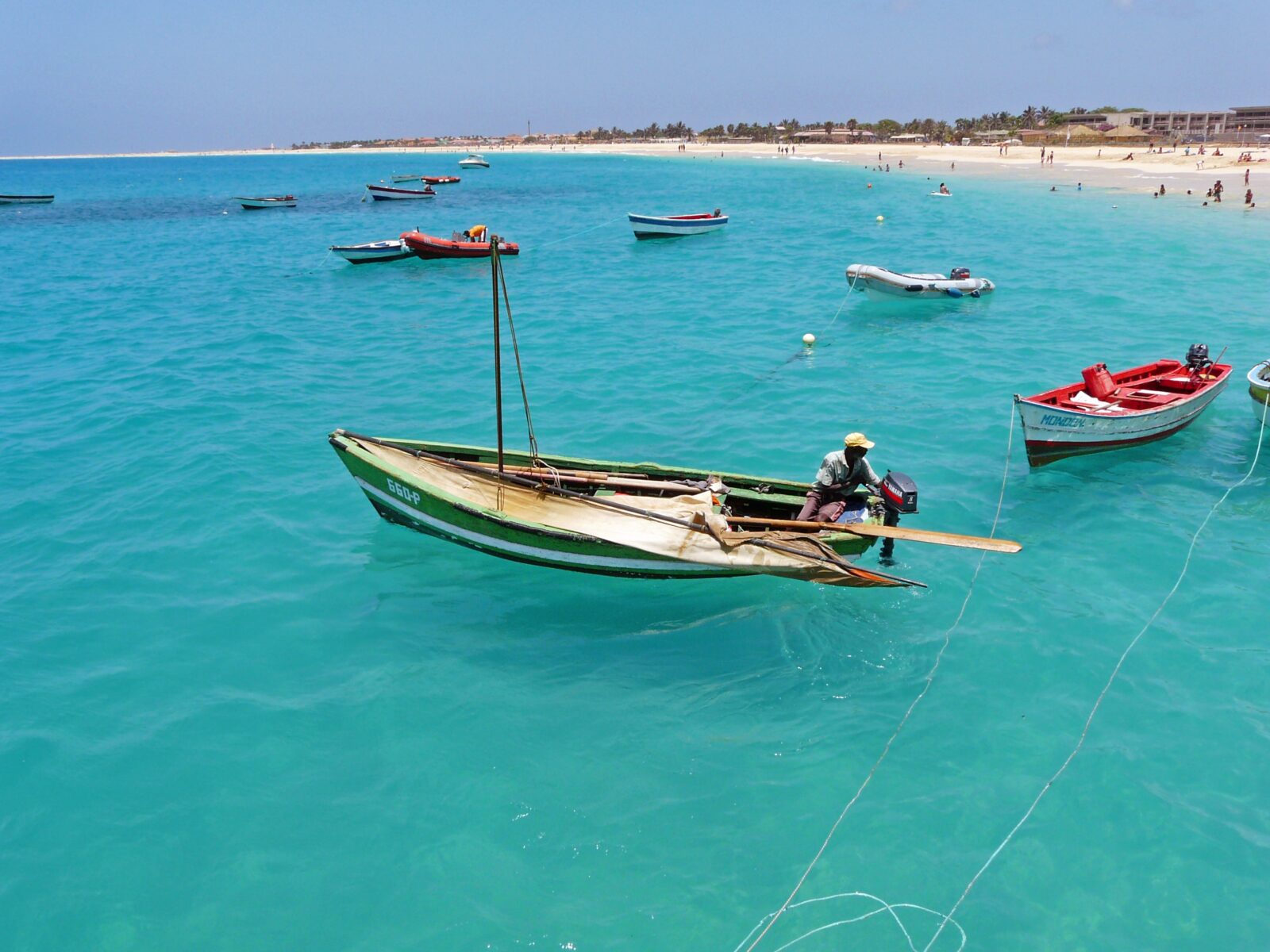NATION IN VIEW: CABO VERDE

Samuel Phillips is a writer, graphic designer, photographer, songwriter, singer…
Small but Mighty
I got interested in Cabo Verde (also known as Cape Verde), a 10-island nation whose name means green cape when I was searching for the names of African countries that we have not featured in this magazine. As I was looking at the list of various countries, I saw the name Cabo Verde, and along with the name, a caption that reads something about the country being one of the countries with the highest living standards in West Africa.
West Africa! I found myself exclaiming. I didn’t know Cape Verde was in Africa not to even speak of West Africa where I am from. I have always thought that Cape Verde was one of the Islands in the Caribbean.
I was even more embarrassed than shocked that I had never looked into this country even though I have been writing African stories for a while now. My wife reminded me that we had spoken about Cabo Verde before – during the Paris 2024 Olympics – and that she had told me then that the country is African. Poor me! I could not recollect that conversation.
Anyway, Cabo Verde stood out among the list of countries we have not featured, so I decided the January 2025 issue would be about this mighty nation of Africa. Especially, since the nation captures the thought in my heart about how we as a people must use 2025 as the year to consolidate the various small aspects of our lives as Africans and begin to operate from the centralized and united fronts. Simply put, we need to quickly empower the various small and diverse aspects of our lives, and bring them together to form a mighty and formidable system that can withstand the changing nature of our world.
In this light, the picture of a ten-island nation just gives a beautiful perspective of unity and a central force. Makes a lot of sense.
I do not know much about Cabo Verde, so I borrowed some insights from https://www.visit-caboverde.com/en/about-cabo-verde a website that tells the story of the Cabo Verdean people and nation.
The Mixed Heritage of Cabo Verdeans
Cabo Verdeans are a diverse people with rich and mixed ancestry. Their roots trace back to African groups such as the Fulani, Balanta, and Mandinka, alongside Portuguese, Italian, French, and Spanish influences. The population also includes descendants of Sephardic Jews expelled from the Iberian Peninsula during the Inquisition, who were among the first settlers of the islands.
This blending of heritages is reflected in demographic statistics: approximately 70% of the population is of mixed race, over 25% are Black, and about 1% are Caucasian.
Languages of Cabo Verde
Portuguese serves as the official language, used in education, government, and the media. However, Cabo Verdean Creole, a language with a Portuguese lexical base, is the everyday spoken language. This Creole emerged in the early days of settlement in the sanzalas (slave quarters) as a tool for communication among enslaved people of diverse linguistic backgrounds.
Creole remains central to Cabo Verdean identity, even among descendants in the global diaspora. This linguistic heritage reflects the resilience of the culture, with Cabo Verdean Creole serving as a second language for many in the diaspora.
The Cabo Verdean Diaspora
Cabo Verde’s global diaspora is often referred to as the “11th island,” with more Cabo Verdeans living abroad than on the archipelago. Emigration has long been a significant part of the nation’s history, starting with escapes from slavery. During Portuguese colonial rule, many Cabo Verdeans worked as laborers in other Lusophone African countries, served as merchant seamen, or found employment as domestic workers in Europe.
Historical Background
The Cabo Verde archipelago was uninhabited until its discovery in 1460 by Portuguese explorers under King Afonso V. Settlement began two years later. For centuries, Cabo Verde’s strategic location made it a hub for trade, supplies, and the transatlantic slave trade, connecting Europe, Africa, Brazil, and North America.
Portuguese colonial dominance continued until the 20th century, but the geographical and administrative distance increasingly strained relations between Cabo Verde and Portugal.
People and Culture
Cabo Verdean culture is an intricate fusion of African and European influences shaped by over five centuries of Portuguese colonialism. Despite this history, African traditions and Creole identity remain deeply embedded in the nation’s cultural fabric.
Artistic expression, particularly in music and literature, reflects this blend. Cabo Verde’s musical styles—morna, funaná, batuque, mazurca, and coladeira—resonate with the spirit of the islands, filling streets with rhythm and joy. Music is not just a cultural expression but a way of life that captivates visitors and lingers in their memories.
The Climate of Cabo Verde
Cabo Verde is a paradise for those who enjoy sunshine and mild temperatures. Situated in the Sahel region, between the arid Sahara Desert and the humid tropical zone, the archipelago experiences an arid and semi-arid climate.
The dry season dominates much of the year, with rainfall limited to a brief rainy season of about three months. Even then, rains often occur only on a few days. Rugged islands like Fogo, Santo Antão, and Santiago receive slightly more rainfall, allowing greenery to flourish in certain areas.
This unique climate creates striking landscapes that showcase both resilience and natural beauty.
Facts About Cabo Verde
Capital and Government
Cabo Verde’s capital, Praia, is located on the island of Santiago. The country operates as a parliamentary republic, governed by a president and a unicameral national assembly.
Language and Demonym
Portuguese is the official language, while Cabo Verdean Creole (Kriolu), a unique blend of African and Portuguese influences, is the national language and widely spoken. Citizens of Cabo Verde are referred to as Cabo Verdeans or Cape Verdeans.
Geography and Climate
The archipelago, volcanic in origin, features diverse terrains, from flat, arid islands to rugged, mountainous landscapes. The climate is generally moderate, with stable temperatures. However, the islands experience extreme dryness for much of the year, except during the hot and humid months of August and September.
Economy and Culture
Cabo Verde’s economy is primarily service-based, with key sectors including tourism, commerce, transportation, and public services. The nation boasts a rich cultural heritage, blending Portuguese, African, Brazilian, and Cuban influences evident in its music, cuisine, and traditions.
History and Independence
When Portuguese explorers discovered the archipelago in the 15th century, it was uninhabited. Cabo Verde gained independence from Portugal on July 5, 1975, following a prolonged struggle for freedom.
Demographics and Population
Cabo Verde is home to approximately 611,014 people, with the majority residing on Santiago Island. A significant portion of the Cabo Verdean population lives abroad, particularly in the United States, Europe, and parts of Africa, forming a vibrant diaspora community.
Prayer for Cabo Verde
After reading the various thoughts shared online about Cabo Verde, I am like “I need to visit this country.” I just simply love the story and different places in this country, and would love to visit.
So, I pray for you mighty nation of Cabo Verde, you are not just a collection of ten small and big islands, you are a beacon of hope and you are mighty indeed. I pray that even as small as your population may be, you will rise and rise into the fullness of the purpose for which you were formed as an African nation.
There is a blessing in unity and as you unite much more to tell a different positive story from what has been told of Africa, may you be richly blessed with all that makes a nation truly great.
Amen.
What's Your Reaction?
Samuel Phillips is a writer, graphic designer, photographer, songwriter, singer and a lover of God. As an Afrikan content creator, he is passionate about creating a better image and positive narrative about Afrika and Afrikans. He is a true Afrikan who believes that the true potential of Afrika and Afrikans can manifest through God and accurate collaborations between Afrikans. Afrika is the land of kings, emperors, original wisdom, ancient civilizations, great men and women and not some road-side-aid-begging poor third world continent that the world finds joy in undermining.










